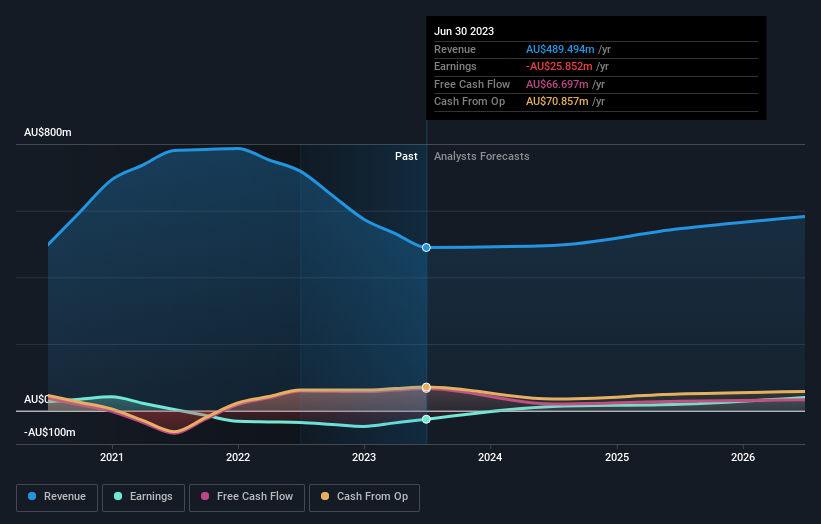Stock Analysis
Kogan.com Ltd's (ASX:KGN) stock price dropped 11% last week; individual investors would not be happy

Key Insights
- Significant control over Kogan.com by individual investors implies that the general public has more power to influence management and governance-related decisions
- 43% of the business is held by the top 25 shareholders
- Insider ownership in Kogan.com is 21%
A look at the shareholders of Kogan.com Ltd (ASX:KGN) can tell us which group is most powerful. We can see that individual investors own the lion's share in the company with 57% ownership. In other words, the group stands to gain the most (or lose the most) from their investment into the company.
Following a 11% decrease in the stock price last week, individual investors suffered the most losses, but insiders who own 21% stock also took a hit.
Let's take a closer look to see what the different types of shareholders can tell us about Kogan.com.
Check out our latest analysis for Kogan.com

What Does The Institutional Ownership Tell Us About Kogan.com?
Institutions typically measure themselves against a benchmark when reporting to their own investors, so they often become more enthusiastic about a stock once it's included in a major index. We would expect most companies to have some institutions on the register, especially if they are growing.
We can see that Kogan.com does have institutional investors; and they hold a good portion of the company's stock. This can indicate that the company has a certain degree of credibility in the investment community. However, it is best to be wary of relying on the supposed validation that comes with institutional investors. They too, get it wrong sometimes. When multiple institutions own a stock, there's always a risk that they are in a 'crowded trade'. When such a trade goes wrong, multiple parties may compete to sell stock fast. This risk is higher in a company without a history of growth. You can see Kogan.com's historic earnings and revenue below, but keep in mind there's always more to the story.

Kogan.com is not owned by hedge funds. The company's CEO Ruslan Kogan is the largest shareholder with 15% of shares outstanding. With 5.2% and 5.1% of the shares outstanding respectively, Hosking Partners LLP and David Shafer are the second and third largest shareholders. Interestingly, the third-largest shareholder, David Shafer is also a Member of the Board of Directors, again, indicating strong insider ownership amongst the company's top shareholders.
On studying our ownership data, we found that 25 of the top shareholders collectively own less than 50% of the share register, implying that no single individual has a majority interest.
While it makes sense to study institutional ownership data for a company, it also makes sense to study analyst sentiments to know which way the wind is blowing. There are plenty of analysts covering the stock, so it might be worth seeing what they are forecasting, too.
Insider Ownership Of Kogan.com
The definition of an insider can differ slightly between different countries, but members of the board of directors always count. Management ultimately answers to the board. However, it is not uncommon for managers to be executive board members, especially if they are a founder or the CEO.
Most consider insider ownership a positive because it can indicate the board is well aligned with other shareholders. However, on some occasions too much power is concentrated within this group.
Our information suggests that insiders maintain a significant holding in Kogan.com Ltd. Insiders have a AU$106m stake in this AU$498m business. This may suggest that the founders still own a lot of shares. You can click here to see if they have been buying or selling.
General Public Ownership
The general public -- including retail investors -- own 57% of Kogan.com. This level of ownership gives investors from the wider public some power to sway key policy decisions such as board composition, executive compensation, and the dividend payout ratio.
Next Steps:
It's always worth thinking about the different groups who own shares in a company. But to understand Kogan.com better, we need to consider many other factors.
Many find it useful to take an in depth look at how a company has performed in the past. You can access this detailed graph of past earnings, revenue and cash flow.
If you are like me, you may want to think about whether this company will grow or shrink. Luckily, you can check this free report showing analyst forecasts for its future.
NB: Figures in this article are calculated using data from the last twelve months, which refer to the 12-month period ending on the last date of the month the financial statement is dated. This may not be consistent with full year annual report figures.
Valuation is complex, but we're helping make it simple.
Find out whether Kogan.com is potentially over or undervalued by checking out our comprehensive analysis, which includes fair value estimates, risks and warnings, dividends, insider transactions and financial health.
View the Free AnalysisHave feedback on this article? Concerned about the content? Get in touch with us directly. Alternatively, email editorial-team (at) simplywallst.com.
This article by Simply Wall St is general in nature. We provide commentary based on historical data and analyst forecasts only using an unbiased methodology and our articles are not intended to be financial advice. It does not constitute a recommendation to buy or sell any stock, and does not take account of your objectives, or your financial situation. We aim to bring you long-term focused analysis driven by fundamental data. Note that our analysis may not factor in the latest price-sensitive company announcements or qualitative material. Simply Wall St has no position in any stocks mentioned.
About ASX:KGN
Flawless balance sheet with high growth potential.


